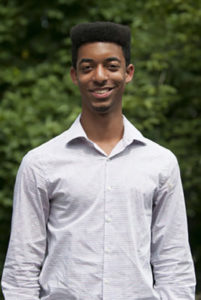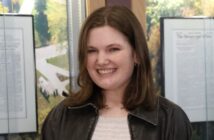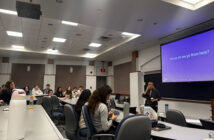Anyone else remember taking a typing class in elementary school? Or taking home economics classes in middle school to learn sewing and cooking? These used to be some of my favorite classes, especially because we were able to practice skills we would actually use later in our lives. Don’t get me wrong, there are still plenty of courses we can take in our academic careers that will prepare us — albeit in different ways — for life after graduation. The difference between now and when I was in elementary school, though, is that technology, and our understanding of it, has changed a lot.

Noah Jalango
Instead of typing classes, kids are learning how to use the internet. Instead of sewing, kids are learning what Wikipedia is. So many of those old, hands-on classes have been replaced by classes based on the digital world. Look, I’m not complaining. A lot of our lives, especially while we’re stuck at home, rely on the internet and technology to keep us moving forward. The education system, though, is not yet up to the same speed. I learned this especially during my time pursuing a journalism major as well as writing and editing for The Brown and White.
Sure, people know how to use the internet now, but how well do they know how to synthesize the information they’re reading? How many people are still only reading the headlines but are commenting as though they have all the correct information?
I witnessed a lot of this, most notably during the week leading up to, and the day of, the election. I’ve seen outraged Instagram followers commenting on photos that any journalist, regardless of political ideology, is obligated to cover. A lot of people don’t understand the principles of journalism that we learn every day, like the fact that journalism’s first obligation is to the truth, and they blindly believe all media is biased and untrustworthy.
As a student of journalism, it hurts to live in a society with a negative perception of the press, but this is exactly why educating yourself is key to creating a holistic understanding of what goes on in the United States and around the world. I think, for example, all college freshmen should take a media literacy seminar. For the young people of today to succeed tomorrow, they need to have an accurate picture in their mind of how societies operate, why they operate the way they do and how different news organizations can distort stories to fit different narratives.
After keeping these considerations in my mind, my entire perception of the world changed. The way I consumed news changed. The ways I had conversations with my family and friends regarding the state of our country changed.
Now, if I’m browsing Twitter, I can see past the attention-grabbing headline. I look for more than one source before accepting what’s been algorithmically thrown in front of me. But that’s because I’m lucky enough to have been trained to do this. Consider the kids in elementary and middle school who have smartphones and tablets but no understanding of the complexity of the internet and its players. How can they tell what’s fact from fiction on the internet? There are a lot of tough questions that can be asked, and there’s no easy answer. But one thing I know for sure is that there are still plenty of reasons to be hopeful.
One of those reasons is The Brown and White. Within this student-run newspaper exists a body of students from a variety of backgrounds who all come together in pursuit of the truth, in pursuit of transparency, in pursuit of holding those in positions of power accountable for their actions.
Good journalism still exists in the world — I swear — and I’ve been fortunate enough to witness that at Lehigh for four years. But there is still work to be done. We don’t stop learning once we graduate, we just also learn how to teach. The Brown and White and the journalism department have taught me so much these past four years, and, for that, I’m eternally grateful.





Comment policy
Comments posted to The Brown and White website are reviewed by a moderator before being approved. Incendiary speech or harassing language, including comments targeted at individuals, may be deemed unacceptable and not published. Spam and other soliciting will also be declined.
The Brown and White also reserves the right to not publish entirely anonymous comments.
1 Comment
I’m chuckling at the revelation that student readers are upset at professional reporting and that The Brown and White (B&W) staff is surprised at it. B&W is a liberal news source for a mostly liberal readership that happens to be professional. Am I blind in that I saw nothing in the coverage in question that was biased and certainly nothing that I would complain about?